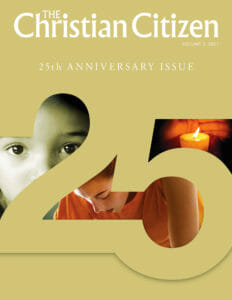
Photo by Carlos Magno on Unsplash
The theological mandate for intercultural ministry
Rev. Dr. Elizabeth Conde-Frazier
November 9, 2021
Editor’s note: This month and next, we are celebrating the 25th anniversary of The Christian Citizen by reprinting articles that previously appeared only in print or on an early version of our website. This article first published in Volume 2, 2009.
Globalization has created a world in which the economic and political systems interface in such a way that we all affect each other. The resources of smaller nation-states are exhausted by the mandate to service the foreign debt and supply workers for multinational corporations. This world situation controls who has access to jobs and where jobs are located, and it has triggered a worldwide migration of millions of persons. Additionally, technology has made it possible for us to become aware of and touch each other’s lives at a global level. At such a time, we are called to understand our sense of mission as engagement in intercultural ministry.
Scripture calls us “to love our neighbor as ourselves” (Matthew 22:39). This is our true vocation as it applies to the calling of our lives in their entirety. Loving ourselves and loving others is spiritual formation in which we are formed through relationships with the goal of becoming closer to God. Because persons are created in the image of God, it is as we respect, appreciate, and serve others that we reverence God. Our various cultures reflect a larger mosaic of God. Spirituality and worship call us to the development of intercultural skills at institutional as well as personal levels of life. Policies and attitudes that allow persons of diverse cultures to live with dignity are necessary alongside the postures and behaviors that create a hospitable environment.
Our times necessitate a transformation of the ideology that promotes greed and consumerism. Values—the shared beliefs, attitudes, and behaviors that are incorporated in social practices and institutional life and give shape to an ideology—are formed, practiced, and transmitted by a living community. To transform the present ideology and hence its power, we must generate a new consciousness that has as its goal the reign of God. Generating a “neighbor consciousness” involves coming to an awareness of the cultural blinders and ideological filters through which we interpret the world. As Christians, we understand that the values of the reign of God guide us. These values are summed up in the mandate to love our neighbors as ourselves.
Pentecost is the defining event that makes of all nations one people whose goal is the reign of God and whose statutes are the law of love. Ephesians 2:14-19 speaks of our common creaturehood in Christ, who breaks down every barrier and hostility, making us citizens and members of the household of God. This shared identity invites us to the responsibility of global citizenship, in which we must reposition ourselves with the purpose of promoting advocacy beyond self-interest and for the welfare of the wider community.
The heart of the gospel is God’s redemptive love. It calls us to work for the redemption of humanity (2 Corinthians 5:14-21) and for all of creation (Romans 8:19-22). We are called to dig wells where water is needed, abolish human trafficking, establish macro-economies, support reforestation, and live ecologically sound lives as part of our kinship with Christ, who reconciled us to God and calls us to the ministry of reconciliation (2 Corinthians 5:18). This is the ministry of reconciliation: the work of reconnecting humanity and celebrating intercultural relations as they were at Pentecost, where all heard the gospel in their particular languages. Language is culture.
Intercultural ministry calls us to perspective transformation, which entails learning to see in each new cultural context opening up to us values and symbols of culture, interaction with and internalization of the stranger, as with Peter and Cornelius (Acts 10). It is a journey through which we learn to reflect on the ways in which we engage with persons different than ourselves. It is a process by which we also deepen our faith.
The work of social institutions cannot be true to social welfare and justice while working out of a distorted image of persons. The image of God serves as a corrective to distortions of humanity and to dehumanizing institutions and provides a necessary guide for working toward justice, informing the formation and maintenance of socio-political and economic institutions. Justice calls us to the praxis of promoting neighbor-consciousness through the faithful practice of working toward sufficiency, solidarity, and emancipation. Sufficiency refers to actions and practices that foster the humanity of others by ensuring them shelter, food, clothing, and water—a standard upon which the nations shall be judged, according to Matthew 25:31-46. Sufficiency is the norm by which the adequacy of human behavior and institutional policies are to be measured. It is the call and mandate to the nations in a time when such standards are threatened worldwide. It is an expression of our intercultural ministry that provides a social understanding of persons and their human rights, a guide to inform and transform the work of social institutions.
 Intercultural ministry calls us to perspective transformation, which entails learning to see in each new cultural context opening up to us values and symbols of culture, interaction with and internalization of the stranger, as with Peter and Cornelius (Acts 10). It is a journey through which we learn to reflect on the ways in which we engage with persons different than ourselves. It is a process by which we also deepen our faith.
Intercultural ministry calls us to perspective transformation, which entails learning to see in each new cultural context opening up to us values and symbols of culture, interaction with and internalization of the stranger, as with Peter and Cornelius (Acts 10). It is a journey through which we learn to reflect on the ways in which we engage with persons different than ourselves. It is a process by which we also deepen our faith.
Faith is an integral part of what makes us who we are. It fashions our worldview. The context of our lives leads us to ask questions of our faith and to find meaning in life. Our realities are different and, therefore, persons from different cultural communities ask and answer different theological questions, making for different expressions of faith. Experiencing other cultural embodiments of faith expands our own understanding.
When we recognize that we are connected and interrelated as humans, we will become concerned with going beyond our tribe, race, class, and nation to an all-embracing and unconditional love expressed through justice. Justice is similar to the biblical concept of shalom. In “A Many Colored Kingdom: Multicultural Dynamics for Spiritual Formation,” I define “shalom” as “a concept that includes many dimensions: love, loyalty, truth, grace, salvation, justice, blessing, and righteousness. It is a biblical vision… where all of creation is one, every creature in community with every other, living in harmony and security toward the joy and well-being of every other creature. Shalom is therefore a vision of connectedness by and for a whole community.”
Intercultural ministry includes self-knowledge and reflection, the ability to overcome ethnocentrism and to tolerate critique of one’s own culture, gaining knowledge of the history and culture of others, and the ability to work through issues of woundedness and forgiveness. These are the works of the ambassadors of reconciliation. According to the American Baptist Churches USA Mission Statement, “Our commitment to Jesus propels us to nurture authentic relationships with one another; build healthy churches; transform our communities, our nations, and our world; engage every member in hands-on ministry; and speak the prophetic word in love.” Let us love our neighbor as ourselves.
Rev. Dr. Elizabeth Conde-Frazier is a practical theologian and author of the book Listen to the Children: Conversations with Immigrant Families, published by Judson Press. She is the coordinator of relations with theological entities in the Association for Hispanic Theological Education. At time of writing, she was dean of Esperanza College in Philadelphia.
The views expressed are those of the author and not necessarily those of American Baptist Home Mission Societies.


